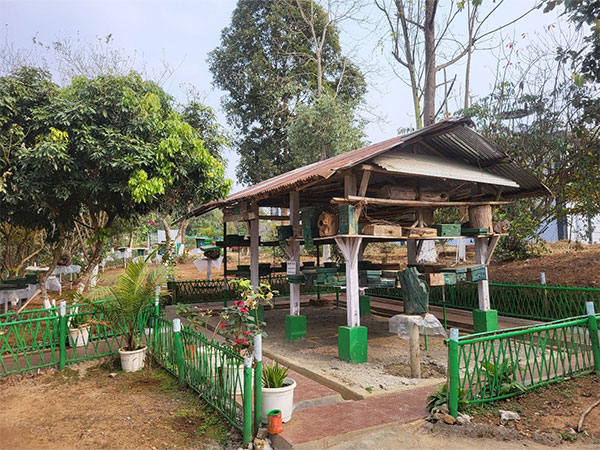Lumami (Nagaland) [India], May 26 (ANI): Researchers from Nagaland University have identified a stingless bee species that can significantly enhance agricultural yield through pollination. The species identified are Tetragonula iridipennis (Smith) and lepidotrigona arcifera (Cockerell).
Introduced stingless bees as pollinators in various crops under greenhouse conditions improved yield and quality markedly. Stingless bees offer a safe pollination alternative, as they do not sting. Additionally, they produce medicinal honey, adding extra income for farmers and enhancing crop productivity.
The research showed that chilli crops pollinated by stingless bees had better production and quality than non-pollinated crops. For instance, in king chilli, fruit set increased to 29.46% compared to 21.00% in non-pollinated crops. In Capsicum annuum, fruit set and the percentage of healthy fruits increased by 7.42% and 7.92%, respectively. Seed weight, an indicator of viability and germination, rose by 60.74% with stingless bee pollination.
To address the pollination deficit in chilli, it is essential to conserve stingless bees, honeybee species like Apis dorsata and Apis florea, and wild pollinators like halictid bees, syrphid flies, and Amegilla bees.
This pioneering research, the first of its kind to evaluate the pollination potential of stingless bees and the quality of honey they produce, has led to increased income and sustainable livelihoods. Earlier, the use of honeybees for pollination was limited due to their natural behaviour and the risk of stings.

Stingless bee pollination of King Chilli flower, an outcome of the Research by Nagaland University (Photo).
The research was led by Dr. Avinash Chauhan, Scientist and Principal Investigator (AICRP Honeybees & Pollinators), Department of Entomology, School of Agricultural Sciences, Nagaland University. Findings have been published in several reputed, peer-reviewed journals, including the *International Journal of Farm Sciences*.
Dr. Chauhan noted, “The outcomes of our research over the past 7-10 years have opened up many opportunities for stakeholders to rear stingless bees for quality honey production without the risk of contamination and with minimal bee loss. This has increased profitability and promoted scientific beekeeping. We are now working to improve beekeeping techniques further and raise awareness about the conservation of wild pollinators.”
Regarding future directions, Dr. Chauhan said, “We plan to study lesser-known but geographically important crops such as passion fruit, Solanum species, and chow-chow. We also aim to refine honey extraction techniques from stingless bees and scientifically analyse the medicinal properties of their honey through mellisopalynological studies.”
The research focused on using stingless bees (Tetragonula and Lepidotrigona spp.) to pollinate crops like cucumber, chilli, king chilli, ash gourd, watermelon, citrus, tomato, pumpkin, brinjal, and dragon fruit. Stingless bee colonies were extracted from forests and fields and scientifically multiplied to enable their use under controlled conditions.
Pollination potential was also observed in mango, guava, Rhus, gooseberry, Ber, and other fruits. Stingless bees are naturally found in Northeast, East, and South India, with recent sightings in North, Central, and Western states. While stingless bee rearing is still in infancy in many areas, traditional homestead apiaries are more common in the Northeast and Southern states.
Over the past decade, Nagaland has made notable progress in the scientific domestication of these bees, including hive development and mass multiplication using queen cells. This success has expanded to Meghalaya and Arunachal Pradesh, making utilising stingless bees for pollination and honey production easier. Farmers and stakeholders can deploy colonies in open fields and greenhouses, leading to better yields and higher-quality produce. (ANI)
Disclaimer: This story is auto-generated from a syndicated feed of ANI; only the image & headline may have been reworked by News Services Division of World News Network Inc Ltd and Palghar News and Pune News and World News
HINDI, MARATHI, GUJARATI, TAMIL, TELUGU, BENGALI, KANNADA, ORIYA, PUNJABI, URDU, MALAYALAM
For more details and packages













